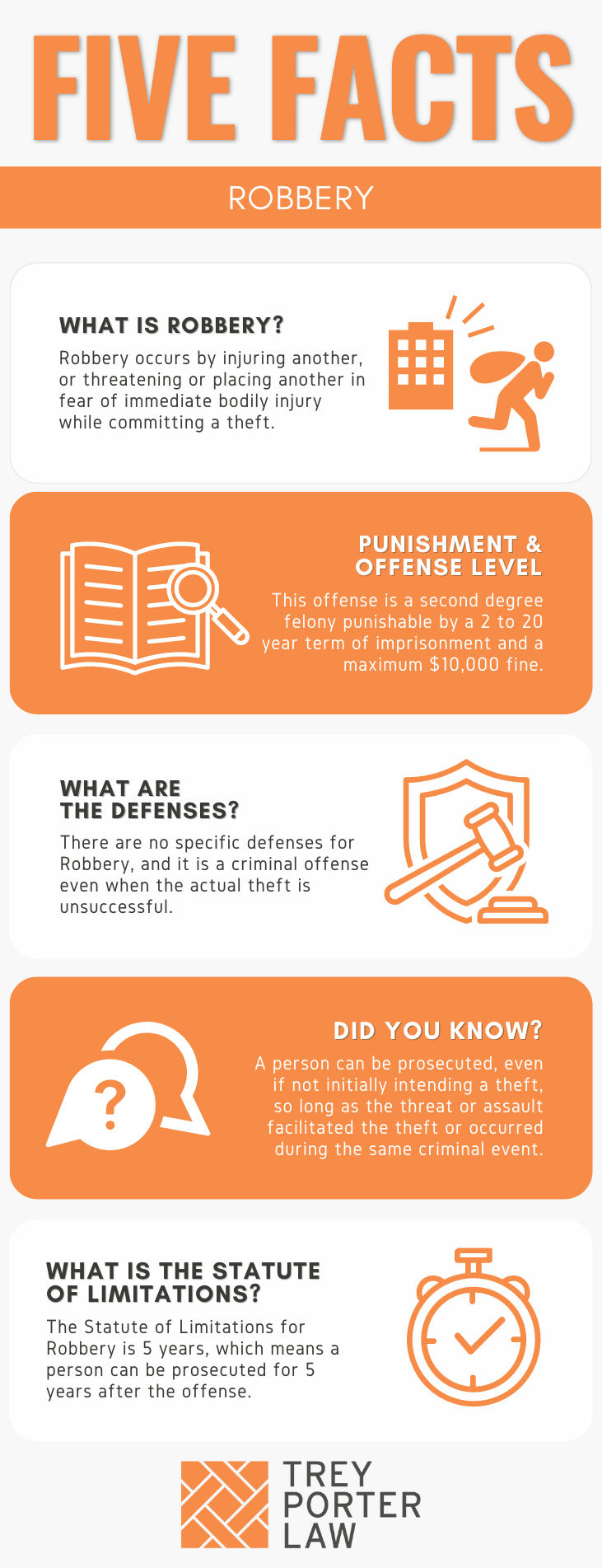WHAT IS ROBBERY IN TEXAS?
The Texas law against robbery prohibits injuring or threatening to injure another, or placing another in fear of imminent bodily injury or death while committing theft. It requires a threat or injury in addition to the theft, and may be enhanced to the higher offense of aggravated robbery if the person caused serious bodily injury or used a deadly weapon.
- What is the difference between theft and robbery? Theft is taking another’s property without consent, and becomes robbery if the person taking or attempting to take property threatens another or causes bodily injury.Texas law permits a robbery conviction even if the accused did not initially intend to commit theft, as long as the threat or assault facilitated the theft or occurred within the same criminal episode. For example, if a person fights someone then takes his wallet, that conduct constitutes robbery-by-assault.
WHAT IS THE ROBBERY LAW IN TEXAS?
Tex. Penal Code § 29.02. ROBBERY.
(a) A person commits an offense if, in the course of committing theft and with intent to obtain or maintain control of the property, he:
(1) intentionally, knowingly, or recklessly causes bodily injury to another; or
(2) intentionally or knowingly threatens or places another in fear of imminent bodily injury or death.
(b) An offense under this section is a felony of the second degree.
WHAT IS THE PENALTY CLASS FOR ROBBERY IN TEXAS?
Robbery is a second degree felony, punishable by two to twenty years in prison.
Texas Penal Code Section 12.50 increases the penalty classification for robbery to a first degree felony, punishable by five to 99 years of life in prison, if a person commits the offense in an area subject to an emergency evacuation order, or under a declaration of a state of disaster by the governor or president of the United States.
WHAT IS THE PUNISHMENT RANGE FOR ROBBERY IN TEXAS?
Robbery is a second degree felony, which carries a possible prison sentence between two and twenty years, and up to a $10,000 fine. If the robbery charge is enhanced to a first degree felony by Section 12.50, it carries five to 99 years or life in prison, and a maximum $10,000 fine.
WHAT ARE THE PENALTIES FOR ROBBERY IN TEXAS?
A person charged with robbery may be eligible for probation after a conviction, or deferred adjudication without a conviction, for a period of up to ten years.
WHAT ARE THE DEFENSES TO ROBBERY IN TEXAS?
People defending themselves against robbery charges usually attempt to negate one of the elements.
- Can a person be charged with robbery if the person did not actually steal anything, or complete the theft? Texas law does not require a successful theft to be charged with robbery. The “gravamen,” or crux, of robbery is the assaultive conduct, not theft. The value of any stolen property is likewise immaterial.
- Can a person be charged with robbery by stealing from one person and threatening or injuring someone else? Yes. The Texas robbery statute does not require the victim of theft or attempted theft and the victim of a threat or injury be the same for a robbery conviction. A person may be convicted of aggravated robbery after stealing from one victim, and threatening another in the same criminal episode.
WHAT IS THE STATUTE OF LIMITATIONS FOR ROBBERY IN TEXAS?
The limitation period for robbery, a second degree felony, is five years.
ROBBERY IN TEXAS
The presence of a threat or injury is what distinguishes robbery from ordinary theft. There are three ways in which a person may commit robbery, all while in the course of committing theft: (1) placing another in fear of bodily injury or death; (2) causing another bodily injury; or (3) threatening another with imminent bodily injury or death. However, actually committing a theft is not a prerequisite to committing robbery.
TEXAS ROBBERY COURT CASES
The case law regarding robbery in Texas illustrates the distinction between the three ways of committing the offense. The Court of Criminal Appeals has declared robbery as a form of assault, so the focus—or “allowable unit of prosecution”—is the victim.
- A person does not need to verbally threaten another in order to commit robbery. In Sexton v. State, a woman saw the defendant, an employee of a pool service she had recently canceled, outside her house. She let him in, and he said, “I need to talk to you . . . you are going to give me your wedding ring.” Based on the defendant’s aggressive demeanor, the victim was shocked and scared, so she gave it to him. He grabbed her, but she ran.The defendant was convicted of robbery-by-placing-in-fear, and the appellate court affirmed. The defendant’s intimidating demeanor and actions were of such nature that the victim was in fear.
- Can shoplifting be charged as robbery in Texas? Yes. During shoplifting incidents, loss prevention will often confront the thief. If the thief fights back, or threatens the loss prevention officer, the offense becomes a robbery.In Hernandez v. State, a defendant was walking out of a J.C. Penny with stolen merchandise, and a loss prevention officer (“LPO”) stopped him. They got into a scuffle, and the defendant injured the LPO’s face, shoulder, and hand. The trial court and appellate court found the defendant intentionally, knowingly, or recklessly caused bodily injury to the LPO while in immediate flight from committing theft.













